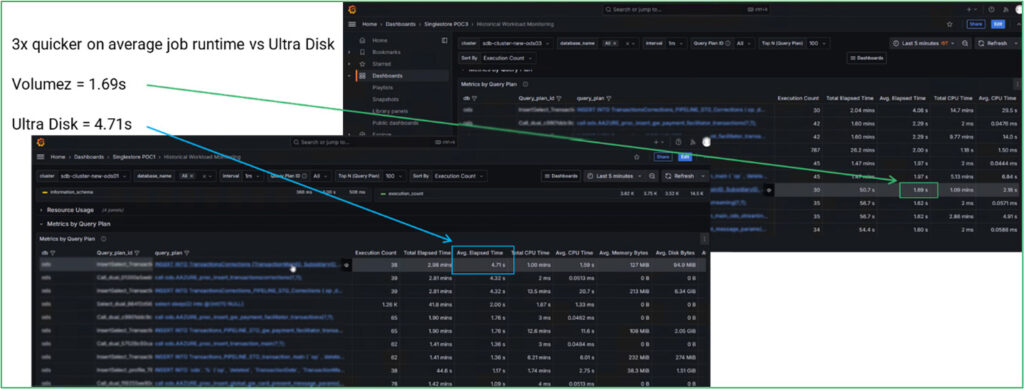Head of Sales, EMEA
Shai Harony
After migrating its SingleStore-based fraud detection platform from AWS gp3 to Azure, a global payments company found that latency on Premium SSD v2 (2–3.5 ms) severely degraded fraud classification speed. Even Azure Ultra Disk, while performing higher, proved cost prohibitive for 24/7 real time decisioning workloads. By adopting Volumez backed storage, the company sustained 0.5 ms latency, achieved 60K IOPS at 2.5 GB/s throughput on 8 TB SingleStore Leaf nodes, eliminated I/O queue bottlenecks, and improved average query execution speed by 3×. Benchmark driven validation confirmed that Volumez not only restored sub millisecond performance but also delivered ~30% lower storage costs and up to 50% compute savings — proving critical for scaling fraud detection on Azure.
Background
The customer is a global payment technology company that provides end-to-end payment processing solutions. It serves a wide range of industries by enabling businesses to accept a variety of payment methods—including credit, debit, gift cards, mobile payments, and more—both online and in-store. The customer’s platform supports eCommerce, point-of-sale systems, and integrated payments with a strong focus on fraud management, authorization optimization, and transaction risk reduction.
The customer leverages SingleStore as the backbone for unified analytics and operational intelligence. It powers critical internal dashboards and real-time fraud detection tied to payment transactions. The architecture heavily depends on low-latency storage to sustain high transaction throughput, enabling:
- Reduced fraud classification latency
- Real-time, continuous decisions on transaction approvals and denials
- Reduced false declines leading to an improved customer experience
Fraud detection workload
The company defines fraud classification latency as the time from transaction initiation to the point when fraud detection logic classifies it and a production system issues an approve/decline decision. After their cloud migration, overall performance proved extremely sensitive to storage latency and throughput:
- Before the Azure move (established baseline on AWS/gp3):
- Their low-latency storage enabled rapid data access for SingleStore, powering real-time queries.
- Fraud detection logic received transaction data and completed classification with sub-millisecond latency, allowing fast, real-time approval/denial decisions.
- This ensured minimum delays—reducing the risk of false declines and optimizing user experience.
- After migrating to Azure (initially on Premium SSD v2):
- The measured storage latency was 2ms up to 3.5ms—too high for their fraud pipeline.
- Real-time query response was slower, leading to increased delay in fraud classification and decision-making.
- Through benchmarking, latency and transaction-per-second (TPS) metrics were key in evaluating the impact of Azure’s volume types. They confirmed that Azure Premium SSD v2 couldn’t match AWS gp3’s low-latency performance needed for their operational pipeline.
- The VM limited the Azure PV2 disk to a maximum of 50K IOPS with 850MB/s throughput
- Post-optimization (with Azure Ultra Disk and Volumez):
- The company ran comparative tests—measuring latency, IOPS, and bandwidth for fraud classification in production-equivalent scenarios.
- While Azure Ultra Disk provided higher IOPS and bandwidth, the substantially higher cost eroded workload cost-efficiency and negatively impacted operating margins.
- Benchmarking with (not against) real-world fraud detection workloads showed that Volumez-backed storage exceeded AWS gp3–level latency and throughput, while delivering ~30% lower cost than Azure Ultra Disk.
In summary, the company validated every storage change with benchmark-driven tests on their fraud detection pipeline, proving that even millisecond-level latency differences directly affected decision speed, false declines, and ultimately operating margins. Volumez allowed them to restore and even exceed migration-level performance while reducing Azure Ultra Disk costs by ~30%.
Benchmarking and the Volumez solution
Apples-to-apples benchmarks showed that Azure Ultra Disk delivered lower performance per dollar compared with AWS gp3.
This is where Volumez made the difference:
- Delivered 20% to ~50% faster processing and ~30% to nearly 100% more throughput across test scenarios.
- Pricing based on provisioned capacity, IOPS, and bandwidth—tailored per workload.
- Comparative benchmark: For 60,000 IOPS and 3GB/s, Volumez was ~30% cheaper than Ultra.
Storage performance validation: 8TB SingleStore Leaf nodes on Azure
Post-migration, the company validated their SingleStore Leaf nodes scaling to 8 TB per node without compromising ultra-low-latency performance essential for fraud detection.
Dashboard telemetry showed:
- High sustained read throughput: Bandwidth peaks up to 2.5 GB/s.
- Strong read IOPS: Regularly 50,000 with peaks at 60,000.
- Ultra-low read latency: Maintained around 500 microseconds.
- Efficient write operations: Average IO sizes between 64–96 KiB.
- Stable queue depth: Minimal queuing even during peak workloads.
These metrics confirm that the SingleStore Leaf configuration with Volumez meets or exceeds Azure Ultra Disk performance specifications while delivering cost savings.

Benchmark insights: Why Volumez outperforms Azure Disk for SingleStore workloads
Benchmarking identified a significant performance gap: when using Azure disks alone, without Volumez, high-bandwidth workloads caused slower batch processing, longer I/O queues, and occasional processing failures. For SingleStore clusters, these bottlenecks directly reduced operational efficiency and increased overall costs.
By contrast, Volumez consistently delivers the high throughput, low latency, and reliable processing required for real-time analytics and complex queries, all while improving cost efficiency compared with Azure disks alone.
Key Findings
- Superior Speed & Throughput – Volumez processed data 19.7% to 48.5% faster than Azure Disk.
- Higher Data Processing Rates – Delivered 28.7% to 95.6% more throughput across test scenarios.
- Lower Cost per Batch – Especially in cost-optimized configurations, Volumez cut per-batch processing costs significantly.
- Consistent, Reliable Performance – Eliminated the large I/O queue depth issues and run failures observed with Azure Disk under heavy workloads.
Why it matters for SingleStore
In data-intensive operational analytics, every millisecond of latency and every IOPS matters. Volumez accelerates pipeline execution while minimizing compute and storage overhead, allowing clusters to process higher workloads without additional scaling.
The result: faster analytics, lower cost, and greater infrastructure efficiency — making Volumez a perfect choice for optimizing SingleStore environments on Azure.
Technical Outcomes
- The company achieved AWS gp3-level performance—or better—on Azure with Volumez, a critical success for fraud detection and query workloads.
- Volumez beat Azure Ultra Disk in throughput, latency, and query speed while cutting 8 TB node storage costs by ~30% and compute costs by up to 50%.
- The storage configuration sustained 0.5 ms latency, removed I/O bottlenecks, tripled query speed, improved reliability, and enabled scale without extra disks or licenses.
This comprehensive view reinforces the importance of meticulous benchmarking and aligning storage infrastructure with demanding real-time operational intelligence workloads during cloud migration. This ensures the company’s real-time analytics and fraud detection systems remain both high-performance and cost-efficient — a balance that was one of the core challenges of the AWS-to-Azure migration.
Key benefits of Volumez on Azure + SingleStore deployment
- Best-in-Class Cost/Performance
- Outperforms Azure Ultra Disk in throughput, latency, and query speed — at lower cost.
- 8 TB cost comparison:
- Azure Ultra: $6,000/month (8TB, 60,000 IOPS, 2.5GB/s)
- Volumez: $4,430/month (9TB, 250K IOPS, 3.5GB/s)
- Savings: ~30% monthly cost reduction for 4X better performance
- Predictable, Consistent Latency
- Sustained 0.5 ms read latency under heavy workloads.
- Removes SingleStore I/O bottlenecks, enabling 3X faster average query execution (1.69 s vs 4.71 s).

- Direct End-User Impact
- Heavy, complex requests drop from 20 seconds to 4 seconds — drastically improving response times and user experience, see Figure 2.
- Improved Infrastructure Control & Security
- Full control of the data path by routing storage traffic through a customer-managed VNET, rather than shared managed disk or DB services — reducing the attack surface.
- Faster Root Cause Analysis (RCA)
- End-to-end Azure infrastructure monitoring enables real-time analysis of any component, reducing Mean Time to Repair (MTTR) in case of failures.
- High Availability & Data Protection
- Real-time storage mirroring protects SingleStore nodes from disk failures, improves read performance, and minimizes rebuild needs that could take up to 8 hours.

- Database Efficiency & Scalable Growth
- Optimized I/O reduces the need to expand the cluster prematurely — even with a planned 40% workload growth.
- Enables scaling without adding more Ultra Disks, SingleStore licenses, or Azure VMs.
- Compute Cost Savings for Future Growth
- With Volumez, the company can use D32 VMs instead of D64 when scaling — delivering 50% compute savings.
- Typical cluster scale increment cost comparison:
- Ultra Disk path: 2×VM ($2,200) + 2×Ultra ($12,000) + 2×SingleStore license ($4,400) = $18,600/month
- Volumez path: Significantly less at equivalent performance levels.
Security and compliance considerations
Security and compliance follow a clear shared responsibility model. The SingleStore and Volumez data path components run entirely inside the customer’s Azure tenant and virtual networks, so the customer inherits Azure’s audited compliance for the underlying infrastructure and platform services, while orchestration and lifecycle management use the Volumez hosted control plane, which is SOC 2 attested, for policy enforcement and automation. This architecture supports PCI DSS 4.0, ISO 27001, SOC 2, and GDPR requirements by combining Entra ID with MFA and role-based access control, managed identities for workloads, TLS for all data in transit, private endpoints and no public IPs, network security groups with deny by default rules, centralized and immutable logging and integration with the client’s enterprise SIEM. The customer owns data classification, access governance, key management, SingleStore configuration, monitoring and incident response, evidence preparation, and regional data residency choices. Microsoft Azure provides the compliant cloud infrastructure and managed service assurances within the customer tenant, and Volumez provides SOC 2 audited control plane operations with documented hardening guidance for data path components deployed in the tenant, with operational telemetry limited to what is required for health and performance and configurable under the customer’s policies.
Conclusion
The company’s Azure storage journey underscores a critical truth for real time analytics: infrastructure choices directly impact both performance and cost efficiency. Initial postmigration challenges with Azure’s native disk options revealed the importance of ultralow latency, high throughput storage in maintaining sub-millisecond fraud classification and seamless customer experiences.
By adopting Volumez for its SingleStore deployment, the company not only restored AWS gp3‑class performance but exceeded it — achieving 0.5 ms read latency, 3X faster query execution, and ~30% lower storage costs compared to Azure Ultra Disk, with up to 50% compute cost savings at scale.
The takeaway is clear: benchmark driven validation and workload specific storage tuning can turn a costly cloud migration hurdle into a competitive advantage — delivering faster decisions, improved customer experience, and a scalable foundation for future growth.
Head of Sales, EMEA
Shai Harony
Shai is the Head of Sales, EMEA at Volumez. Shai has extensive experience in building and scaling global businesses, working across sales, technical sales, and channel management. With over 20 years in the industry, Shai has contributed to the growth of storage brands from the ground up. Prior to Volumez, he spent over 12 years at IBM in various roles, including Executive Storage Sales Manager, WW Storage Tech Sales, and XIV Storage Architect, where he focused on customer satisfaction and fostering strong client relationships.
